| Listing 1 - 10 of 13 | << page >> |
Sort by
|
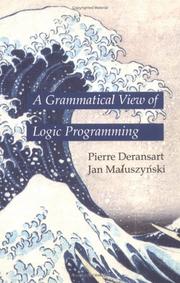
ISBN: 0262041405 9780262290845 0262290847 9780262041409 Year: 1993 Publisher: Cambridge (Mass.): MIT press
Abstract | Keywords | Export | Availability | Bookmark
 Loading...
Loading...Choose an application
- Reference Manager
- EndNote
- RefWorks (Direct export to RefWorks)
Computer science --- Logic programming --- 681.3*F4 --- 681.3*I23 --- Computer programming --- Mathematical logic and formal languages (Theory of computation) --- Deduction and theorem proving: answer/reason extraction; reasoning; resolution; metatheory; mathematical induction; logic programming (Artificial intelligence) --- Logic programming. --- 681.3*F4 Mathematical logic and formal languages (Theory of computation) --- 681.3*I23 Deduction and theorem proving: answer/reason extraction; reasoning; resolution; metatheory; mathematical induction; logic programming (Artificial intelligence)
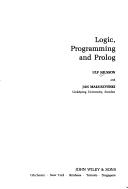
Abstract | Keywords | Export | Availability | Bookmark
 Loading...
Loading...Choose an application
- Reference Manager
- EndNote
- RefWorks (Direct export to RefWorks)
Programming --- Logic programming --- Logisch programmeren --- Logische programmering --- PROLOG (Computer program language) --- PROLOG (Computer programmeertaal) --- PROLOG (Langage de programmation) --- Programmation logique --- Programmeren [Logisch ] --- Programming [Logic ] --- Prolog (Computer program language) --- 681.3*D16 --- 681.3*D32 --- 681.3*F3 --- 681.3*I23 --- Computer programming --- Computerwetenschap--?*D16 --- language classifications: applicative languages; data-flow languages; design languages; extensible languages; macro and assembly languages; nonprocedural languages; specialized application and very high-level languages (Programminglanguages) --- Logics and meanings of programs (Theory of computation) --- Deduction and theorem proving: answer/reason extraction; reasoning; resolution; metatheory; mathematical induction; logic programming (Artificial intelligence) --- 681.3*I23 Deduction and theorem proving: answer/reason extraction; reasoning; resolution; metatheory; mathematical induction; logic programming (Artificial intelligence) --- 681.3*F3 Logics and meanings of programs (Theory of computation) --- 681.3*D32 language classifications: applicative languages; data-flow languages; design languages; extensible languages; macro and assembly languages; nonprocedural languages; specialized application and very high-level languages (Programminglanguages) --- Logic programming.
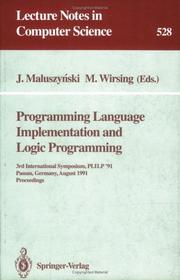
ISBN: 3540544445 0387544445 354038362X Year: 1991 Volume: vol 528 Publisher: Berlin ; New York, NY : Springer-Verlag,
Abstract | Keywords | Export | Availability | Bookmark
 Loading...
Loading...Choose an application
- Reference Manager
- EndNote
- RefWorks (Direct export to RefWorks)
This volume contains the papers which have been accepted for presentation atthe Third International Symposium on Programming Language Implementation andLogic Programming (PLILP '91) held in Passau, Germany, August 26-28, 1991. The aim of the symposium was to explore new declarative concepts, methods and techniques relevant for the implementation of all kinds of programming languages, whether algorithmic or declarative ones. The intention was to gather researchers from the fields of algorithmic programming languages as well as logic, functional and object-oriented programming. This volume contains the two invited talks given at the symposium by H. Ait-Kaci and D.B. MacQueen, 32 selected papers, and abstracts of several system demonstrations. The proceedings of PLILP '88 and PLILP '90 are available as Lecture Notes in Computer Science Volumes 348 and 456.
Logic programming --- -Programming languages (Electronic computers) --- -681.3*D34 --- 681.3*F33 --- 681.3*F4 --- 681.3*I23 --- Computer programming --- Congresses --- Processors: code generation; compilers; interpreters; optimization; parsing; preprocessors; run-time environments; translator writing systems and compilergenerators (Programming languages) --- Studies of program constructs: control primitives; functional constructs; program and recursion schemes; type structure (Logics and meanings of programs)-- See also {681.3*D32}; {681.3*D33} --- Mathematical logic and formal languages (Theory of computation) --- Deduction and theorem proving: answer/reason extraction; reasoning; resolution; metatheory; mathematical induction; logic programming (Artificial intelligence) --- 681.3*I23 Deduction and theorem proving: answer/reason extraction; reasoning; resolution; metatheory; mathematical induction; logic programming (Artificial intelligence) --- 681.3*F4 Mathematical logic and formal languages (Theory of computation) --- 681.3*F33 Studies of program constructs: control primitives; functional constructs; program and recursion schemes; type structure (Logics and meanings of programs)-- See also {681.3*D32}; {681.3*D33} --- 681.3*D34 Processors: code generation; compilers; interpreters; optimization; parsing; preprocessors; run-time environments; translator writing systems and compilergenerators (Programming languages) --- Programming languages (Electronic computers) --- 681.3*D34 --- Programming languages (Electronic computers) - Congresses. --- Logic programming - Congresses. --- Computer science. --- Logic, Symbolic and mathematical. --- Artificial intelligence. --- Logic design. --- Programming Techniques. --- Mathematical Logic and Foundations. --- Programming Languages, Compilers, Interpreters. --- Mathematical Logic and Formal Languages. --- Artificial Intelligence. --- Logics and Meanings of Programs. --- Design, Logic --- Design of logic systems --- Digital electronics --- Electronic circuit design --- Logic circuits --- Machine theory --- Switching theory --- AI (Artificial intelligence) --- Artificial thinking --- Electronic brains --- Intellectronics --- Intelligence, Artificial --- Intelligent machines --- Machine intelligence --- Thinking, Artificial --- Bionics --- Cognitive science --- Digital computer simulation --- Electronic data processing --- Logic machines --- Self-organizing systems --- Simulation methods --- Fifth generation computers --- Neural computers --- Algebra of logic --- Logic, Universal --- Mathematical logic --- Symbolic and mathematical logic --- Symbolic logic --- Mathematics --- Algebra, Abstract --- Metamathematics --- Set theory --- Syllogism --- Informatics --- Science
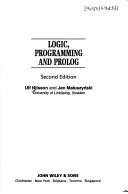
ISBN: 0471959960 9780471959960 Year: 1995 Publisher: New York: Wiley,
Abstract | Keywords | Export | Availability | Bookmark
 Loading...
Loading...Choose an application
- Reference Manager
- EndNote
- RefWorks (Direct export to RefWorks)
Digital
ISBN: 9783540316756 Year: 2005 Publisher: Berlin Heidelberg Springer-Verlag GmbH
Abstract | Keywords | Export | Availability | Bookmark
 Loading...
Loading...Choose an application
- Reference Manager
- EndNote
- RefWorks (Direct export to RefWorks)
Computer science --- Computer architecture. Operating systems --- Information systems --- Artificial intelligence. Robotics. Simulation. Graphics --- Computer. Automation --- ICT (informatie- en communicatietechnieken) --- IR (information retrieval) --- bedrijfseconomie --- programmeren (informatica) --- informatiesystemen --- informatica management --- computernetwerken --- robots
Digital
ISBN: 9783642045813 Year: 2009 Publisher: Berlin, Heidelberg Springer Berlin Heidelberg
Abstract | Keywords | Export | Availability | Bookmark
 Loading...
Loading...Choose an application
- Reference Manager
- EndNote
- RefWorks (Direct export to RefWorks)
Computer science --- Computer architecture. Operating systems --- Information systems --- Artificial intelligence. Robotics. Simulation. Graphics --- ICT (informatie- en communicatietechnieken) --- bedrijfseconomie --- programmeren (informatica) --- informatiesystemen --- database management --- informatica management --- computernetwerken --- robots
Book
Year: 1985 Publisher: Le Chesnay Institut national de recherche en informatique et en automatique
Abstract | Keywords | Export | Availability | Bookmark
 Loading...
Loading...Choose an application
- Reference Manager
- EndNote
- RefWorks (Direct export to RefWorks)
Book
ISBN: 9783540316756 Year: 2005 Publisher: Berlin Heidelberg Springer-Verlag GmbH.
Abstract | Keywords | Export | Availability | Bookmark
 Loading...
Loading...Choose an application
- Reference Manager
- EndNote
- RefWorks (Direct export to RefWorks)
This volume contains the tutorial papers of the Summer School Reasoning Web, July25-29,2005(http://reasoningweb. org). TheSchoolwashostedbythe University of Malta and was organized by the Network of Excellence REWERSE Reasoning on the Web with Rules and Semantics (http://rewerse. net), funded by the EU Commission and by the Swiss Federal O?ce for Edu- tion and Science within the 6th Framework Programme under the project ref- ence number 506779. The objective of the school was to provide an introduction into methods and issues of the Semantic Web, a major endeavor in current Web research, where the World Wide Web Consortium W3C plays an important role. The main idea of the Semantic Web is to enrich Web data with meta-data carrying a meaning of the data and allowing Web-based systems to reason about data (and meta-data). The meta-data used in Semantic Web applications is usually linked to a conceptualization of the application domain shared by di?erent applications. Such a conceptualization is called an ontology and sp- i?es classes of objects and relations between them. Ontologies are de?ned by ontology languages, based on logic and supporting formal reasoning. Just as the current Web is inherently heterogeneous in data formats and data semantics, the Semantic Web will be inherently heterogeneous in its reasoning forms. - deed, any single form of reasoning turns out to be insu?cient in the Semantic Web.
Computer science --- Computer architecture. Operating systems --- Information systems --- Artificial intelligence. Robotics. Simulation. Graphics --- Computer. Automation --- ICT (informatie- en communicatietechnieken) --- IR (information retrieval) --- bedrijfseconomie --- programmeren (informatica) --- informatiesystemen --- informatica management --- computernetwerken --- robots
Book
ISBN: 9783642045813 Year: 2009 Publisher: Berlin Heidelberg Springer Berlin Heidelberg
Abstract | Keywords | Export | Availability | Bookmark
 Loading...
Loading...Choose an application
- Reference Manager
- EndNote
- RefWorks (Direct export to RefWorks)
The objective of this state-of-the-art survey is to give a coherent overview of the main topics and results achieved by the Network of Excellence REWERSE on "Reasoning on the Web", funded by the European Commission and Switzerland within the "6th Framework Programme" (FP6), from 2004 to 2008. The material has been organized into eight chapters, each of which addresses one of the main topics of REWERSE: hybrid reasoning with rules and ontologies, lessons in versatility or how query languages adapt to the Web, evolution and reactivity in the Semantic Web, rule-based policy representations and reasoning, component models for Semantic Web languages, controlled English for reasoning on the Semantic Web, semantic search with GoPubMed, and information integration in bioinformatics with ontologies and standards. Each chapter gives an in-depth coverage of the subject and provides an extensive bibliography with pointers to further literature.
Computer science --- Computer architecture. Operating systems --- Information systems --- Artificial intelligence. Robotics. Simulation. Graphics --- ICT (informatie- en communicatietechnieken) --- bedrijfseconomie --- programmeren (informatica) --- informatiesystemen --- database management --- informatica management --- computernetwerken --- robots
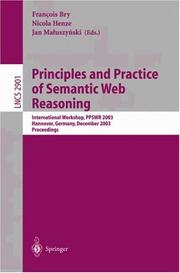
ISBN: 1280306513 9786610306510 3540245723 3540205829 Year: 2003 Publisher: Berlin, Heidelberg : Springer Berlin Heidelberg : Imprint: Springer,
Abstract | Keywords | Export | Availability | Bookmark
 Loading...
Loading...Choose an application
- Reference Manager
- EndNote
- RefWorks (Direct export to RefWorks)
The Semantic Web is a major endeavor aimed at enriching the existing Web withmetadataandprocessingmethodssoastoprovideWeb-basedsystemswith advanced(so-calledintelligent)capabilities,inparticularwithcontext-awareness and decision support. The advanced capabilities striven for in most Semantic Web application s- narios primarily call for reasoning. Reasoning capabilities are o?ered by exi- ing Semantic Web languages, such as BPEL4WS, BPML, ConsVISor, DAML-S, JTP, TRIPLE, and others. These languages, however, were developed mostly from functionality-centered (e.g., ontology reasoning or access validation) or application-centered (e.g., Web service retrieval and composition) perspectives. A perspective centered on the reasoning techniques (e.g., forward or backward chaining, tableau-like methods, constraint reasoning, etc.) complementing the above-mentioned activities appears desirable for Semantic Web systems and - plications. The workshop on “Principles and Practice of Semantic Web Reas- ing,” which took place on December 8, 2003, in Mumbai, India, was the ?rst of a series of scienti?c meetings devoted to such a perspective. JustasthecurrentWebisinherentlyheterogeneousindataformatsanddata semantics, the Semantic Web will be inherently heterogeneous in its reasoning forms.Indeed,anysingleformof reasoningturnsouttobeirrealin theSemantic Web. For example, ontology reasoning in general relies on monotonic negation (for the metadata often can be fully speci?ed), while databases, Web databases, and Web-based information systems call for non-monotonic reasoning (for one would not specify non-existing trains in a railway timetable); constraint reas- ing is needed when dealing with time (for time intervals have to be dealt with), while(forwardand/orbackward)chainingisthereasoningofchoicewhencoping with database-like views (for views, i.e., virtual data, can be derived from actual data using operations such as join and projections).
Computer science. --- Software engineering. --- Information storage and retrieval systems. --- Information systems. --- Artificial intelligence. --- Computer Science. --- Information Systems Applications (incl.Internet). --- Software Engineering. --- Mathematical Logic and Formal Languages. --- Information Storage and Retrieval. --- Artificial Intelligence (incl. Robotics). --- Semantic Web --- Telecommunications --- Electrical & Computer Engineering --- Engineering & Applied Sciences --- Popular works. --- Mathematical logic. --- Database management. --- Information storage and retrieval. --- Popular Science. --- Popular Computer Science. --- Database Management. --- Information Systems Applications (incl. Internet). --- Information storage and retrieva. --- Informatics --- Science --- Computer software engineering --- Engineering --- Data base management --- Data services (Database management) --- Database management services --- DBMS (Computer science) --- Generalized data management systems --- Services, Database management --- Systems, Database management --- Systems, Generalized database management --- Electronic data processing --- Automatic data storage --- Automatic information retrieval --- Automation in documentation --- Computer-based information systems --- Data processing systems --- Data storage and retrieval systems --- Discovery systems, Information --- Information discovery systems --- Information processing systems --- Information retrieval systems --- Machine data storage and retrieval --- Mechanized information storage and retrieval systems --- Computer systems --- Electronic information resources --- Data libraries --- Digital libraries --- Information organization --- Information retrieval --- Application software. --- Algebra of logic --- Logic, Universal --- Mathematical logic --- Symbolic and mathematical logic --- Symbolic logic --- Mathematics --- Algebra, Abstract --- Metamathematics --- Set theory --- Syllogism --- Application computer programs --- Application computer software --- Applications software --- Apps (Computer software) --- Computer software
| Listing 1 - 10 of 13 | << page >> |
Sort by
|

 Search
Search Feedback
Feedback About UniCat
About UniCat  Help
Help News
News